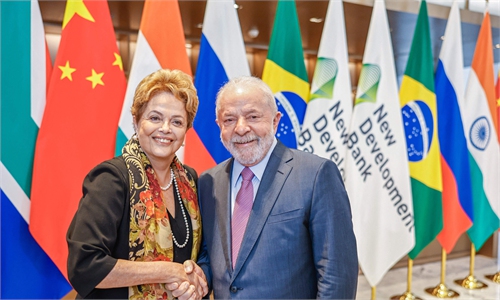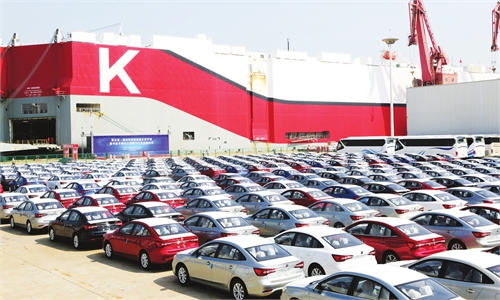
Illustration: Tang Tengfei/GT
Brazil today is the world's top sugarcane producer, accounting for 32.5 percent of global production, according to the US Department of Agriculture. The past several decades have seen complex and intricate sugarcane-related industrial chains built across the South American country.
Now, Brazil is reportedly home to the world's largest fleet of cars that use ethanol derived from sugarcane. In addition, hybrid-fuel cars - powered by a mix of gasoline and ethanol - are also popular in the local market.
Currently, the US has focused on using electric vehicles (EVs) as a replacement for gasoline guzzlers. European countries are adopting a similar approach. However, there is no standard answer in developing countries to the question of how their domestic auto industries will shift toward clean energy. Each country may have its own unique traits, behaviors, and attitudes - and they rarely match the stereotypes ascribed by Western politicians, scholars, and entrepreneurs.
Brazil is a typical example. Some studies have shown that pure ethanol accounted for about 20 percent of Brazil's car-fuel consumption in 2022. The figure may help people gain an intuitive sense of the unique nature of Brazil's auto market.
Some in the West tend to view Brazil's unique solution to curb tailpipe emissions as a problem for global auto giants peddling EVs. In contrast to these Western voices, Chinese entrepreneurs try to adapt their products to the situation in Brazil and make their companies a positive force in driving the continued development of Brazil's auto industry.
BYD and Great Wall Motor are among Chinese auto giants that have been pouring investment into the South American country. Ricardo Bastos, president of the Brazilian Association of Electric Vehicles, lauded the leading role of Chinese companies in bringing new technologies to Brazil. He told Xinhua in an interview that Chinese technology and investment in EVs "will allow Brazil to take a leap toward decarbonization on the environmental agenda."
While many have been focusing on Chinese auto companies' increased presence and the recent surge in China's auto exports to Brazil, less attention has been paid to the underlying story. First, Chinese automakers can adapt to Brazil's needs, showing their efficiency and flexibility. Washington's narrative claiming that Chinese companies gain advantages through government subsidies is far from the truth.
Second, as the West's auto industry shifts slowly toward electrification, companies in China and other developing countries have begun to work on new techniques and explore ways to develop diversified sources of renewable energy.
Third, China's auto investment can be a positive motivating force for industrialization and reindustrialization. Some Western observers may try to provoke anti-China sentiment by smearing China's green products as suffering from "overcapacity," or hyping the rhetoric that "China dumps cheap goods on the global market." Contrary to these claims, China's EV boom has created investment, cooperation opportunities, and manufacturing jobs to the rest of the world.
China and Brazil have maintained frequent high-level visits in recent years and made fruitful achievements in various areas. The ongoing visit of Brazilian Vice President Geraldo Alckmin is expected to help push forward the China-Brazil relations.
Areas of friction may continue to exist between China and Brazil. However, a rational approach can help bilateral relations to move forward and overcome divergences. The auto industry is just one example of China-Brazil cooperation. Overall, China's investment has demonstrated its vigor and flexibility by adapting to Brazil's needs and promoting the reindustrialization process of the country. In particular, cooperation can help alleviate the financial and technological shortages faced by Brazil in the process of reindustrialization.
The US-led West may need self-reflection about how to deal with China's investment and China's development.
The author is a reporter with the Global Times. bizopinion@globaltimes.com.cn



